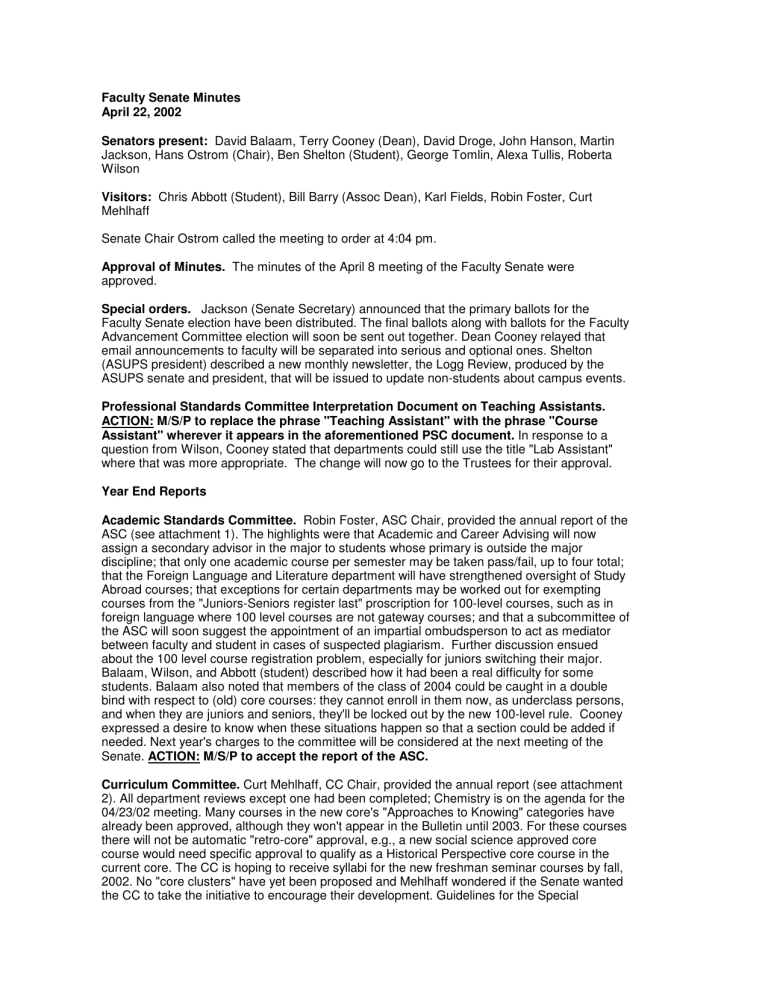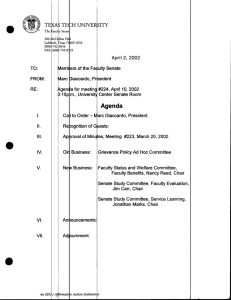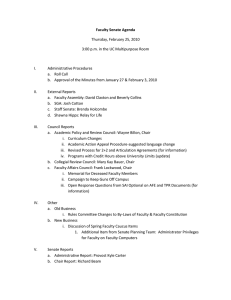Faculty Senate Minutes April 22, 2002 Senators present:

Faculty Senate Minutes
April 22, 2002
Senators present: David Balaam, Terry Cooney (Dean), David Droge, John Hanson, Martin
Jackson, Hans Ostrom (Chair), Ben Shelton (Student), George Tomlin, Alexa Tullis, Roberta
Wilson
Visitors: Chris Abbott (Student), Bill Barry (Assoc Dean), Karl Fields, Robin Foster, Curt
Mehlhaff
Senate Chair Ostrom called the meeting to order at 4:04 pm.
Approval of Minutes.
The minutes of the April 8 meeting of the Faculty Senate were approved.
Special orders. Jackson (Senate Secretary) announced that the primary ballots for the
Faculty Senate election have been distributed. The final ballots along with ballots for the Faculty
Advancement Committee election will soon be sent out together. Dean Cooney relayed that email announcements to faculty will be separated into serious and optional ones. Shelton
(ASUPS president) described a new monthly newsletter, the Logg Review, produced by the
ASUPS senate and president, that will be issued to update non-students about campus events.
Professional Standards Committee Interpretation Document on Teaching Assistants.
ACTION: M/S/P to replace the phrase "Teaching Assistant" with the phrase "Course
Assistant" wherever it appears in the aforementioned PSC document.
In response to a question from Wilson, Cooney stated that departments could still use the title "Lab Assistant" where that was more appropriate. The change will now go to the Trustees for their approval.
Year End Reports
Academic Standards Committee.
Robin Foster, ASC Chair, provided the annual report of the
ASC (see attachment 1). The highlights were that Academic and Career Advising will now assign a secondary advisor in the major to students whose primary is outside the major discipline; that only one academic course per semester may be taken pass/fail, up to four total; that the Foreign Language and Literature department will have strengthened oversight of Study
Abroad courses; that exceptions for certain departments may be worked out for exempting courses from the "Juniors-Seniors register last" proscription for 100-level courses, such as in foreign language where 100 level courses are not gateway courses; and that a subcommittee of the ASC will soon suggest the appointment of an impartial ombudsperson to act as mediator between faculty and student in cases of suspected plagiarism. Further discussion ensued about the 100 level course registration problem, especially for juniors switching their major.
Balaam, Wilson, and Abbott (student) described how it had been a real difficulty for some students. Balaam also noted that members of the class of 2004 could be caught in a double bind with respect to (old) core courses: they cannot enroll in them now, as underclass persons, and when they are juniors and seniors, they'll be locked out by the new 100-level rule. Cooney expressed a desire to know when these situations happen so that a section could be added if needed. Next year's charges to the committee will be considered at the next meeting of the
Senate. ACTION: M/S/P to accept the report of the ASC.
Curriculum Committee.
Curt Mehlhaff, CC Chair, provided the annual report (see attachment
2). All department reviews except one had been completed; Chemistry is on the agenda for the
04/23/02 meeting. Many courses in the new core's "Approaches to Knowing" categories have already been approved, although they won't appear in the Bulletin until 2003. For these courses there will not be automatic "retro-core" approval, e.g., a new social science approved core course would need specific approval to qualify as a Historical Perspective core course in the current core. The CC is hoping to receive syllabi for the new freshman seminar courses by fall,
2002. No "core clusters" have yet been proposed and Mehlhaff wondered if the Senate wanted the CC to take the initiative to encourage their development. Guidelines for the Special
Interdisciplinary Major were tightened. Shelton remarked that students have told him the SIM is
"impossible" to get approved. Actually this year one proposal was approved and one was not.
Mehlhaff noted that usually students use the SIM route as a way to turn a minor (Environmental
Studies, Women's Studies) into a major, and that much faculty input was required so that SIM would not become a way for students to evade difficult required courses in a regular major.
Meanwhile, the Art major was allowed to have a requirement for 11 units, since it was felt to resemble a Music (performing) major. Finally, Mehlhaff mentioned that the CC was assessing their fallow year core guideline review procedures. ACTION: M/S/P/ to accept the CC report.
University Enrichment Committee. Karl Fields, UEC Chair, provided the annual report (see attachment 3). He announced that the UEC had approved an increase in the maximum allowance for international travel, from $1280 to $1500, for AY02-03. He noted that despite some concern, that indeed undergraduates were receiving 63% of student research grants each year. For transcription costs in research, in the future the UEC will approve what they consider to be the going rate. In response to a question from the Chair, Fields affirmed that funding for research and travel is indeed keeping up with inflation. ACTION: M/S/P to accept the report of the UEC.
The meeting was adjourned at 5:10 pm.
From the left front corner of the square,
George Tomlin


